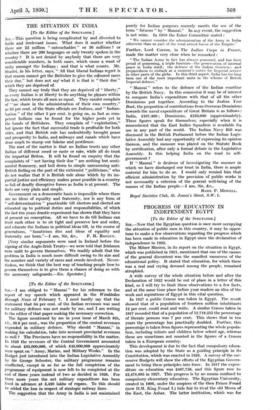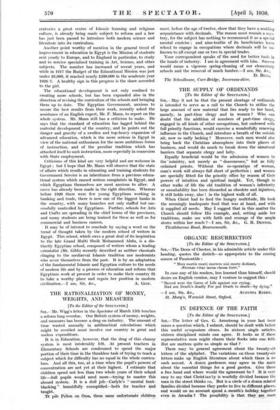PROGRESS OF EDUCATION IN INDEPENDENT EGYPT
[To the Editor of the SPECTATOR.]
Sra,—Now that the Egyptian question is once more occupying the attention of public men in this country, it may be oppor- tune to make a few observations regarding the progress which has been made in education in. Egypt since the declaration of independence in 1922.
The Milner Mission, in its report on the situation in Egypt, which was published in 1921, mentioned that one of the causes of the general discontent was the manifest unsuccess of the educational policy. It stated that education, for which there was a real and crying demand among the people, remained atrophied.
A wide survey of the whole situation before and after the Declaration of 1922 would be out of place in a letter of this kind, so I will try to limit these observations to a few facts, and at the same time place before your readers an idea of the work and aspirations of Egypt in this vital question.
In 1927 a public Census was taken in Egypt. The result showed that of a population of fourteen million inhabitants 12 per cent. could read and write. A similar Census taken in 1917 recorded that of a population of 12,718,255 the percentage of literate persons was 7 per cent. This shows that in ten years the percentage has practically doubled. Further, this percentige is taken from figures representing the whole popula- tion, including infants and children below school age, whereas these are sometimes not counted in the figures of a Census taken in a European country.
This development is due to the fact that compulsory educa- tion was adopted by the State as a guiding principle in its Constitution, which was enacted in 1923. A survey of the suc- cessive Budgets will show the efforts of the Egyptian Govern- ment to bring these principles into force. In 1917 the expen- diture on education was £467,758, and this figure rose to £2,478,695 in 1927. This progress is by no means confined to compulsory elementary education. The Egyptian University, created in 1906, under the auspices of the then Prince.Fouad (now H.M. King Fouad I.) bids fair to rival the old Mecca of the East, the Azhar. The latter institution, whieh was for centuries a great centre of Islamic learning and religious culture, is already being made subject to reform and a law has just been passed to introduce both modem science and literature into its curriculum.
Another point worthy of mention in the general trend of improvement in education in Egypt is the Mission of students sent yearly to Europe, and to England in particular, to study and to receive specialised training in Art, Science, and other subjects. The number has increased of recent years, and while in 1917 the Budget of the Educational Mission was just under £6,000, it reached nearly £200,000 in the academic year 1926-7. A healthy sign in this progress is the share accorded to the girl.
The educational development is not only confined to creating more schools, but has been expanded also in the direction of revising the curriculum of the schools and bringing them up to date. The Egyptian Government, anxious to secure the best results from their work, recently asked the assistance of an English expert, Mr. F. Mann, to report on the whole system. Mr. Mann still has a criticism to make. He says that the standard of education has lagged behind the material development of the country, and he points out the danger and gravity of a swollen and top-heavy expansion of advanced education, which is the more serious in Egypt in view of the national enthusiasm for the more ambitious forms of instruction, and of the peculiar tradition which has attached itself to such instruction, more especially in connexion with State employment.
Criticisms of this kind are very helpful and are welcome in Egypt ; but I hope that Mr. Mann will observe that the state of affairs which results in educating and training students for Government Service is an inheritance from a previous educa- tional system which caused serious complaints in Egypt, and which Egyptians themselves are most anxious to alter. A move has already been made in the right direction. Whereas before 1920 there were few young Egyptians working in banking and trade, there is now one of the biggest banks in the country, with many branches not only staffed but suc- cessfully controlled by Egyptians. Further, schools for Arts and Crafts are spreading in the chief towns of the provinces, and many students are being trained for these as well as for commercial and business careers.
- It may be of interest to conclude by saying a word on the trend of thought taken by the modern school of writers in Egypt. This school, which owes a great deal of its inspiration to the late Grand Mufti Sheik Muhammed Abdu, is a dis- tinctly Egyptian school, composed of writers whom a leading
orientalist (Mr. Gibb) recently described as neither classicals
clinging to the mediaeval Islamic tradition nor modernists who sever themselves from the past. It is by an adaptation
of the fundamental Islamic and Egyptian culture to the needs of modern life and by a process of education and reform that Egyptians work at present in order to make their country fit to take a worthy- place and regain her position in modern civilization.—I am, Sir, &c., A. GEIF.











































 Previous page
Previous page